AI unleashes human creativity

“Copilot turned one year old at the beginning of November, as did I as an AI coach. The first year at Sulava showed that the need for coaching change management support is now greater than ever. Empathy quickly became the most important expert skill in the era of artificial intelligence.”
– Emma Klén, Senior Consultant & AI Coach
How to become an AI coach?
A question I hear every week when I tell people about my work. The subject interests. And why not? The fear of job losses as AI threatens the careers of junior coders and assistants is real, and new-sounding professions are attracting attention. When I share how I ended up in my current role, it often provides insight even for those who are worried;
You become an AI coach by discovering that such a profession exists.
So, what is a junior coder or assistant like in the AI era? AI Junior Coder or AI + Human Assistant are at least 2.0 versions of what we are traditionally used to. No one is coming to tell you how to use AI or, even more excitingly, AI transformation to develop your own work and career. These keys are already in your pocket, and the choice of how to use them is up to you.
What does an AI coach do?
As an AI coach, my role involves removing obstacles in mindset level.
In the spring of 2024, when we delivered Copilot adoptions, we quickly realized that coaching was necessary for everyone. In an AI transformation, involving everyone in the work community is essential; it is not enough for just a small group to promote change. We incorporated coaching into our Copilot Adoption Service (CAS), and the feedback especially from international customers has been very positive. Based on customer feedback, we also enhanced our training to be more practical by closely integrating it with the real working day of the people being trained. Consequently, our customers users feel they are rapidly advancing their AI skills, both in mindset and technological expertise.
What distinguishes an AI coach from an AI trainer?
While a trainer discusses technology in an informative and educational manner, a coach asks questions that generate insights through discussion.
A good AI trainer successfully develops people’s AI skills through practical, contextual use cases. A good AI coach sparks conversations about concerns, inspiring people to find curiosity, gather courage, and collaborate.
During the first wave of change, an excellent AI trainer can significantly add value by teaching a target group the use cases identified in workshops. An excellent AI coach goes further by encouraging people to identify, document, and share use cases in their daily lives, creating a snowball effect that soon leads to significant progress.
By combining the expertise of the best AI coaches and trainers, we proudly offer the development of AI expertise at the highest level in the world.
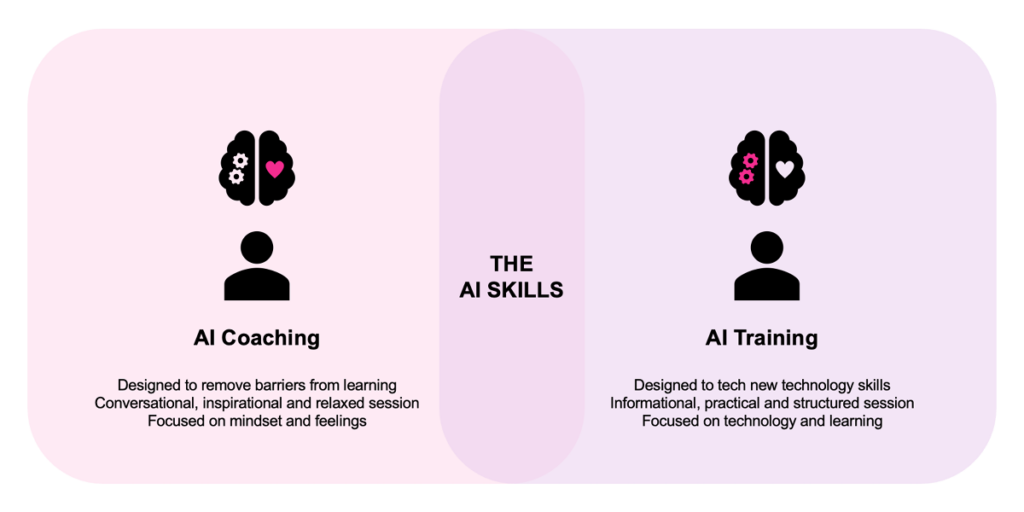
When it comes to our customers who invest most heavily in supporting cultural change and learning AI skills, they achieve results within a few months. After this initial period, the cost of Copilot licenses becomes the least interesting question. For instance, our customer ADNOC has reported achieving a return on investment of hundreds of percent through Copilot (more on this in Ignite!). This journey doesn’t end there, as these organizations continue to implement their AI strategy permanently.
Excellent results have also been achieved here in cautious Finland, but it is concerning that we are moving much slower than the rest of the world. For example, in the UAE, our customers are considering how the benefits of Copilot can be demonstrated on a strategic level as part of the cultural change driven by artificial intelligence, often facilitated by a change coordinator.
Meanwhile, a Finnish IT manager, who has been assigned the implementation of Copilot for some reason, is thinking about how to prove that Copilot is not useful, so that there is no need to buy licenses and IT costs do not increase. The difference is striking, isn’t it?
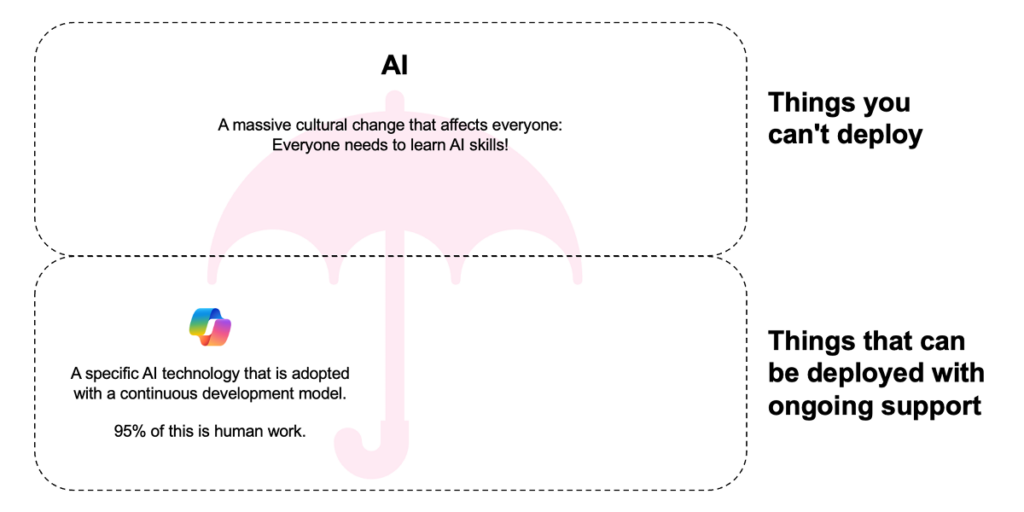
Artificial intelligence came – what should I focus on as an individual?
By focusing on developing your own mindset and AI skills, you can progress quickly and reach a level where you feel in control of AI (at least as part of your work). Ignoring AI and pretending it doesn’t affect you will prevent you from becoming a power user and discovering its benefits. Remember, these benefits are yours to uncover. We can inspire you, but no one can tell you exactly how you should use AI.
When we talk about the Microsoft 365 Copilot, for example, it’s a language model (LLM) which function is to predict the next word based on statistics. By utilizing this capability with secure work data, we can create a powerful tool for work design that transforms how we use our time.
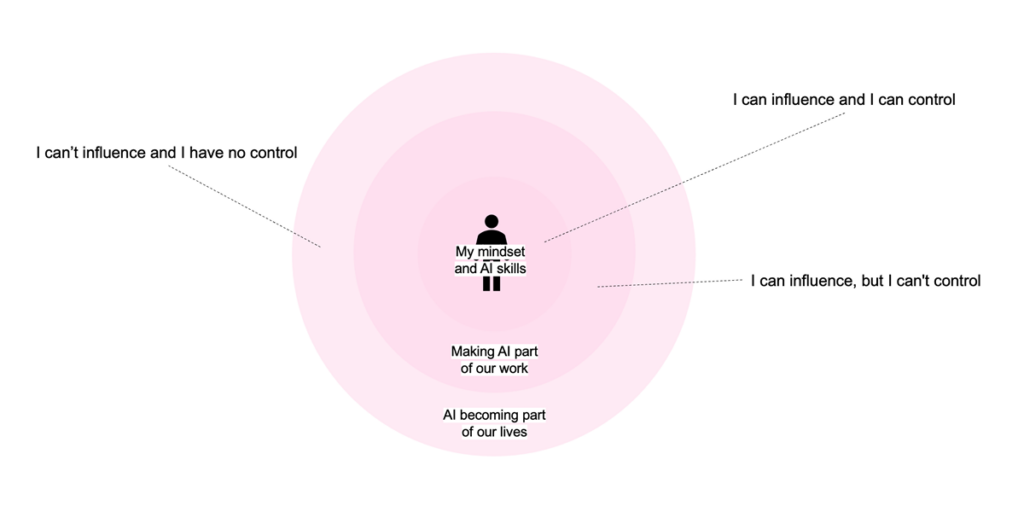
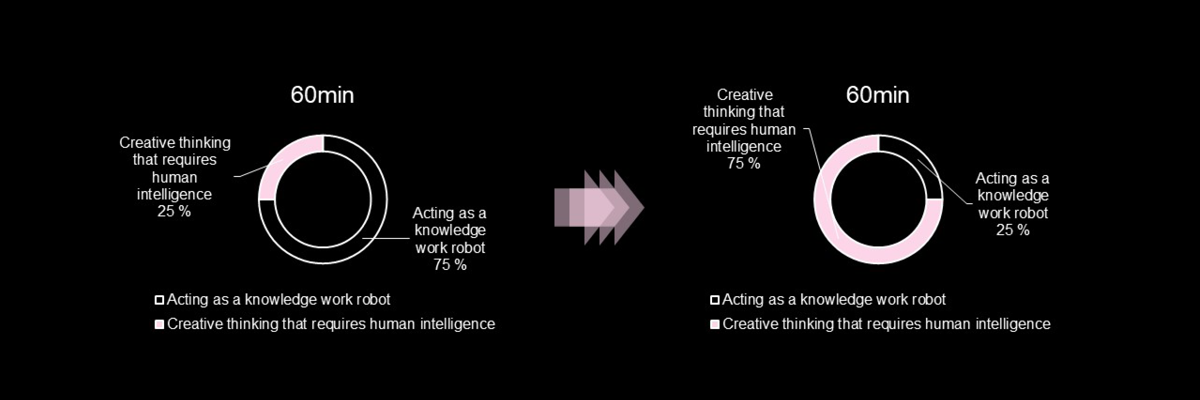
Artificial intelligence is not new, but over the past year, it has dramatically transformed the workplace. While discussions often focus on efficiency and time, it is far more intriguing to explore how we can use our time differently for both human well-being and productivity. Here’s a list to get you started:
- What sparks your curiosity about AI? Pursue it.
- What hinders you from experimenting with courage? Ask questions to break down those barriers.
- Are you collaborating? Be the change: share your learnings with others to learn from others.
The key is to learn how to interact with AI. To master this, you need curiosity, courage, and cooperation. Learning AI skills is an ongoing process and not just a technical task. Even creating prompts is merely a tool for speaking this new language.
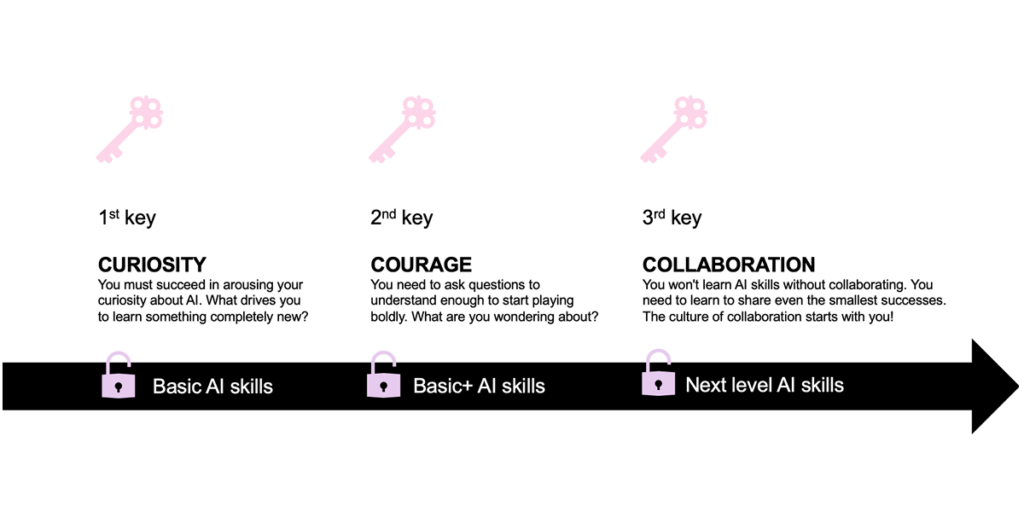
It’s not about whether AI is ready for us; the real question is whether we are ready for AI.
During my first year as an AI coach, embracing this understanding has opened doors to opportunities I had only dreamed of before. We all have this opportunity. Let’s use it!